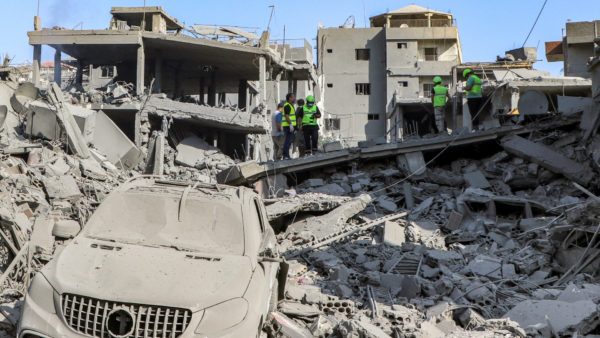Photo : An Israeli strike targeted the Nabatieh municipal building in south Lebanon, killing the city’s mayor and 11 others. Lebanon PM accused Israel of shifting to target the Lebanese state
The mayor of a major town in south Lebanon was among 16 people killed when an Israeli airstrike destroyed its municipal headquarters in the biggest attack on an official Lebanese state building since the Israeli air campaign began.
Lebanese officials denounced the incident, which also wounded more than 50 people in Nabatieh, a provincial capital, saying it was proof that Israel’s campaign against the Hezbollah armed group was now shifting to target the Lebanese state.
The Israelis “intentionally targeted a meeting of the municipal council to discuss the city’s service and relief situation” to aid people displaced by the Israeli campaign, caretaker Prime Minister Najib Mikati said.
The U.N. mission in Lebanon (UNIFIL) said its peacekeepers observed an Israeli tank firing at their watchtower near southern Lebanon’s Kfar Kela on Wednesday morning. Two cameras were destroyed, and the tower was damaged, UNIFIL said.
There was no immediate comment from the Israeli military on the UNIFIL statement.
Israel has previously called on the United Nations to move members of the UNIFIL peacekeeping force in southern Lebanon out of the combat zone for their safety.
UNIFIL says its troops have come under Israeli attack several times, though Israel has disputed accounts of those incidents.
Israeli Defence Minister Yoav Gallant, on a visit to northern Israel near the border, said Israel would not halt its assault on Hezbollah to allow negotiations.
“We will hold negotiations only under fire. I said this on day one, I said it in Gaza and I am saying it here,” he said according to a statement from his office.
Pentagon chief Lloyd Austin on Wednesday spoke to Gallant and “reinforced the importance of taking all necessary measures to ensure the safety and security of UNIFIL forces and the Lebanese Armed Forces,” according to the Department of Defense.
Israel launched its ground and air campaign in Lebanon to dismantle Hezbollah after a year during which the Iran-backed militant group fired across the border in support of the Palestinian militants Hamas in Gaza.
In recent weeks Israel has assassinated Hezbollah’s senior leadership and pushed into southern border towns, saying its aim is to make it safe for tens of thousands of Israelis to return to homes in Israel’s north evacuated under Hezbollah fire.
Israel first issued an evacuation notice for Nabatieh, a city of tens of thousands of people, on Oct. 3. At the time, the city’s Mayor Ahmed Kahil told Reuters he would not leave.
Asked about Israeli strike on Nabatieh, State Department spokesperson Matthew Miller declined to comment on the circumstances of specific strikes but said the U.S. understands Hezbollah operates from places like civilian homes and supported limited strikes to target the group.
“Obviously, we’d not want to see entire villages destroyed. We don’t want to see civilian homes destroyed,” Miller said.
Israel said on Wednesday it struck dozens of Hezbollah targets in the Nabatieh area and its navy also hit dozens of targets in southern Lebanon.
It said it had “dismantled” a tunnel network used by Hezbollah’s elite Radwan Forces in the heart of a town near the border with Israel, publishing a video showing multiple explosions rocking a cluster of buildings. Lebanese officials said it was the small town of Mhaibib.
STRIKES RESUME ON SOUTHERN BEIRUT SUBURBS
Israeli warplanes on Wednesday also hit Beirut’s southern suburbs, in the first attack on the city since Oct. 10, when two strikes near the city centre killed 22 people and brought down entire buildings in a densely populated neighbourhood.
Israeli operations in Lebanon have killed at least 2,350 people over the last year, according to the health ministry, and more than 1.2 million people have been displaced.
The U.N. says a quarter of the country is under evacuation orders. The toll does not distinguish between civilians and combatants but includes hundreds of women and children.
Around 50 Israelis, both soldiers and civilians, have been killed in the same period, according to Israel.
Having long accused UNIFIL of failing in its mission to keep armed fighters out of the border area, Israel adopted a more conciliatory tone earlier on Wednesday.
“The State of Israel places great importance on the activities of UNIFIL and has no intention of harming the organization or its personnel,” Foreign Minister Israel Katz said in a statement.
The 10,000-strong peacekeeper force comprises contingents from 50 countries, including 2,500 Italian, French and Spanish soldiers, causing strain between Israel and some of its most prominent European allies.


Leave a Reply
You must be logged in to post a comment.